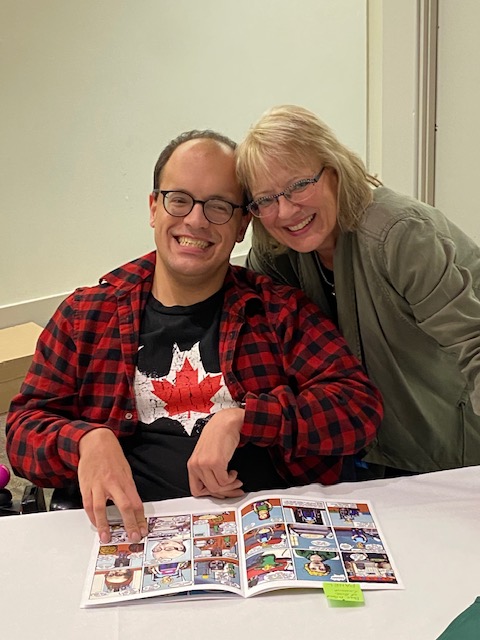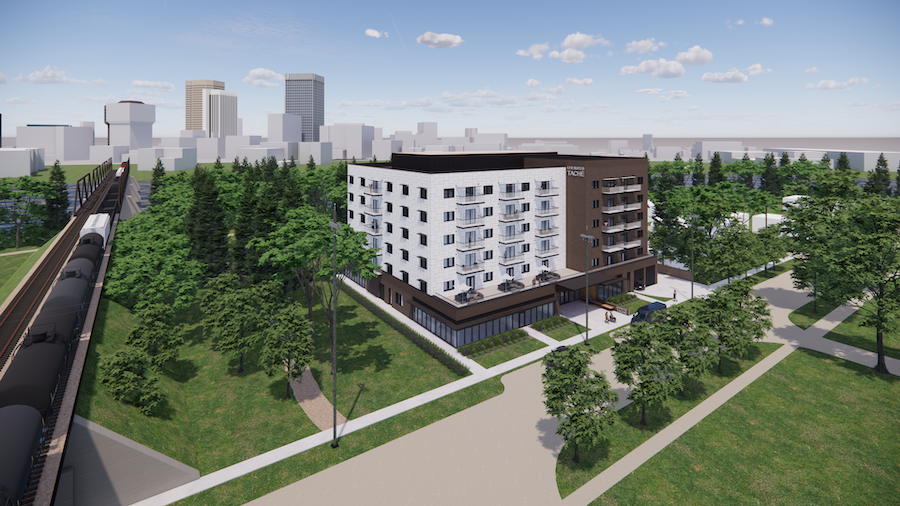A new residential project in St. Boniface is aiming to build an intentional, accessible and inclusive living environment where at least twenty people with physical disabilities could create natural and meaningful connections that would alleviate loneliness and isolation and support their overall well-being.
This summer, Réseau Compassion Network, in collaboration with CoHabit, were invited by the City of Winnipeg to express their interest in the development of an affordable housing project, situated on the land at 825 Taché Avenue. From all the applicants, the City chose our project and made the land available under a 99-year lease agreement at an annual cost of a dollar. Thanks to this opportunity, we have now begun moving forward on the architectural plan creation of a new multi-family building that will give its residents living with a physical disability more agency, freedom of movement and a sense of community.
“We often use the lens of complex poverty to help us determine where we’re needed most in community,” shares Réseau Compassion Network CEO, Daniel Lussier. “Some people living with disabilities lack access to appropriate housing and appropriate care due to their financial means or complex medical requirements. We don’t think that should be a reality in 2025, and when we encountered CoHabit and what they’re trying to achieve, we knew we could help support a solution.”
CoHabit was founded by Margy Nelson, mother to twin boys Sean and Bryce. Now aged 36, Bryce is still living at home with his parents because appropriate housing and supports are nearly impossible to find for someone living with cerebral palsy, as he does. His mother Margy, along with support from many in the disability and broader community, had a vision to build accessible, integrated and affordable apartments that nurture a connected community culture.

The Nelsons are well aware that in Manitoba, there are people with disabilities who fall through the cracks of the services that should support them. “The admission criteria for adult disabilities services is discriminatory,” shares Jennifer Rodrigue, Project Lead with CoHabit. “You only qualify if you acquired your disability in childhood and have an intellectual disability. This means if you experience an injury, a stroke or degenerative disease that leads to significant disabilities, you do not qualify for supports, regardless of your care needs.”
The housing choices for those with disabilities that require accessibility are few and far between. Most of those without supports either live with a loved one or, more concerningly, in long term care environments. “Society is trying to deinstitutionalize care, which is the right call, but there are no services to replace it,” explains Rodrigue. “Even for those who qualify for home care to support their daily living, there are challenges. Trying to hold down a job, a volunteer role or even have a social life while still having to be home to receive services only adds to the isolation felt by those living with disabilities.”
“We often quote David Petoniak, a well-known advocate, who reminds us that people with disabilities are not sick, but sometimes they’re sick with loneliness,” continues Rodrigue. “CoHabit aims to prove that not only do people with disabilities should be able to find housing to fit their needs, but that integrated environments are beneficial to whole communities.”
The 65-unit residences building planned for 825 Taché Avenue will be 100% accessible or accessible-ready, and at least 20 suites will be available at affordable rates for individuals with physical disabilities that will benefit as well from wrap around support services provided by CoHabit. With 45 market-rate suites, the project aim at creating opportunities for connections, interactions and community care. “People with disabilities are by far not the only ones experiencing loneliness,” says Rodrigue. “We are looking to address the very real human rights issue of housing for people with disabilities, and we want to show that there’s a better way forward to everyone. We can build community and address loneliness together.”

